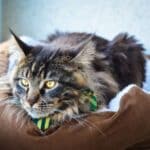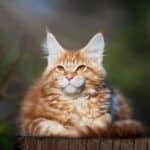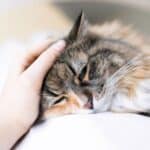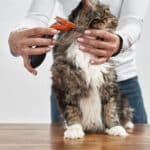No pet owner wants to see their furry family members feeling sick, but it does happen to even the healthiest of animals from time to time. Maine Coon cats are no different. This longhair breed of domestic cats native to North America. While Maine Coons can be genetically predisposed to a few health concerns like cardiomyopathy (a form of heart disease), hip dysplasia, or spinal muscular atrophy, these cats are typically known to be healthy and hardy. Maine Coon cats tend to be active, playful, smart, and affectionate.
When they do happen to get sick it is important to understand what may have caused the illness, how to treat it, and how to prevent it in the future. In this specific case, we will examine the causes, treatment, and prevention of diarrhea in Maine Coon cats.
Jump to:
Causes of Diarrhea in Maine Coon Cats
There are many reasons a Maine Coon cat could have a short episode of diarrhea. Food that has gone bad, a stolen treat they shouldn’t have eaten, or even simple stress can all cause digestive issues in cats. It is important that you give your cat the best diet and to stay aware of your Maine Coon cat’s normal baseline so that you can identify any serious changes or patterns.
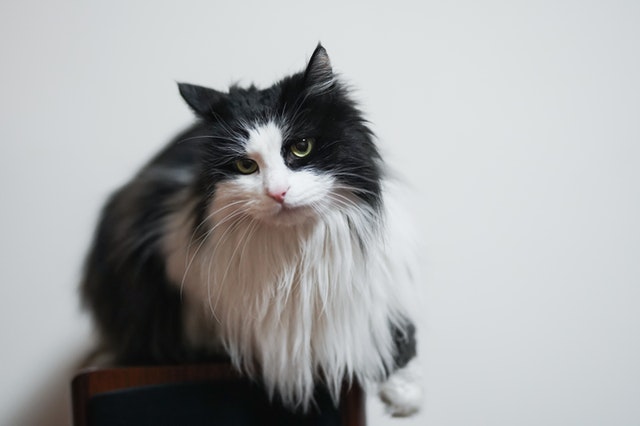
Food Issues
There are many ways food could upset your Maine Coon’s stomach, resulting in diarrhea. If you feed them wet food you will need to be careful not to leave the food sitting all day. Many cats prefer to “graze” and eat their food in several sessions. If your cat is in this camp, be sure to pick up and dispose of their wet food after at most four hours.
After the four-hour mark, you risk letting bacteria grow, resulting in diarrhea when your cat does eat it. If your Maine Coon has a particularly sensitive stomach you may want to pick it up even sooner.
Don’t worry about your cat going hungry, either. They will quickly learn they need to eat more promptly when they see their bowl is empty a few hours later.
Additionally, if you buy the larger cans of wet food that hold multiple meals, be sure to refrigerate the remainder until you are ready to feed the next meal. The same concept about bacteria growth applies whether it is in an opened can or in a food bowl!
Food allergies
Food allergies are also a common source of stomach upset in cats. If the diarrhea is a consistent or even intermittent issue your vet may recommend what is called a “Limited Ingredient Diet.” These foods are usually made with one distinct protein source and one carbohydrate source. That way, animals who are allergic to an ingredient commonly found in many foods can safely eat their food without trouble.
Don’t lose heart if it takes time to find a food that solves the problem and a flavor they will eat, either. There are many options out there. Some are available in ordinary pet supply stores or online while others are available under a veterinarian’s prescription.
Lastly, be careful about treats for your Maine Coon cat. Most human food is much too rich for cats and can quickly cause digestive issues and diarrhea. If your cat is often stealing scrap from your plate or making off with treats they should not be eating, you may have found the source of your trouble.
Stress
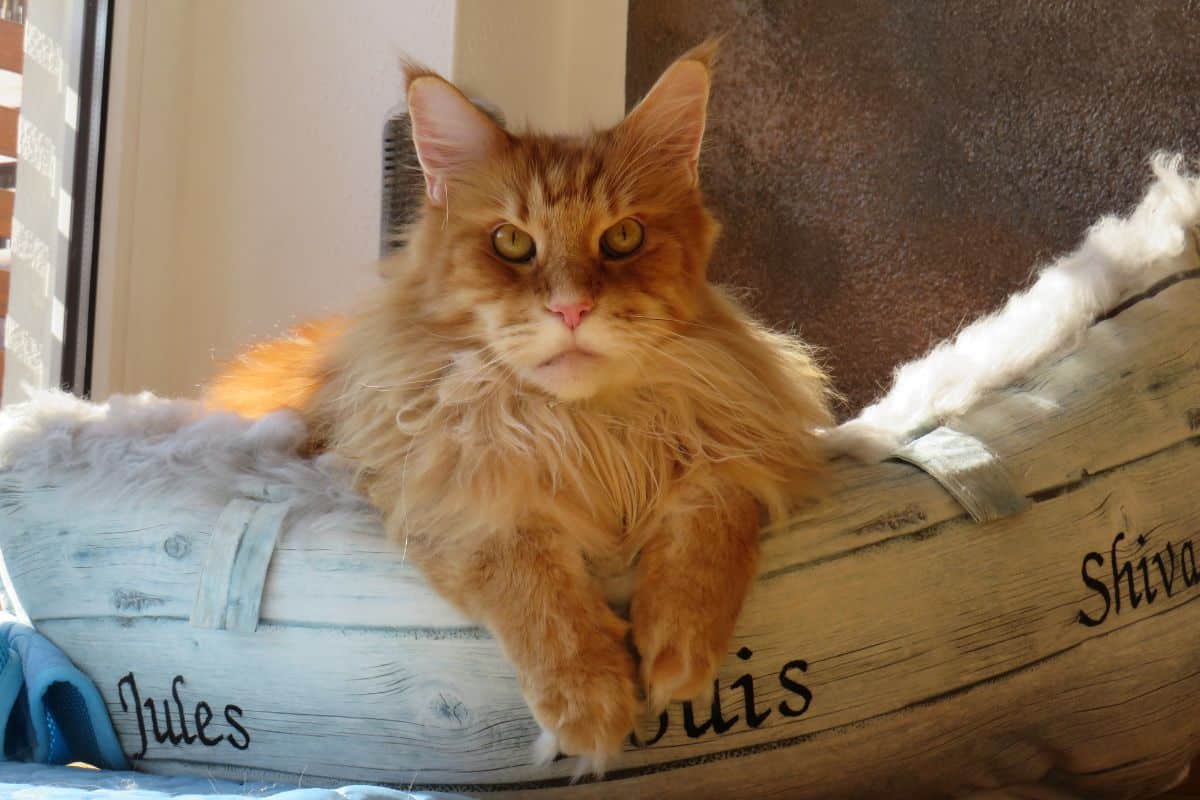
Yes, Maine Coon cats can experience stress! Diarrhea is a common side effect of stress in cats.
Changing environments, new routines, new family members (human, feline, or other species entirely), and many other factors can create stress in a cat’s life, resulting in behavioral and medical concerns, like diarrhea.
If this is the cause, the symptoms should subside within a few days of everything returning to normal. If you have recently made a permanent change, like moving to a new home or bringing home a new pet, make sure your Maine Coon cat has a room they feel safe in and let them take some time to settle in. Maine Coons tend to adjust before you know it.
Serious Medical Issues
Diarrhea, unfortunately, can also be a sign that something more serious is going on with your Maine Coon cat.
Any time your cat has diarrhea that lasts more than a day or two be sure to call your veterinarian. Even if there is a simple explanation, diarrhea can cause dehydration and other complications, so it is important to get to the bottom of the issue fairly quickly.
If the diarrhea is black, bloody, or if your cat also has other symptoms like fever, vomiting, or lack of appetite. These can all indicate something much more serious and urgent is going on.
To get to the bottom of any bout of diarrhea your vet might want to see a stool sample and test for parasites or bacterial infections. They may also investigate issues like inflammatory bowel disease (IBD), pancreatic disease, or intestinal cancers. These illnesses are rare but serious, and important to treat correctly under the care of an experienced vet.
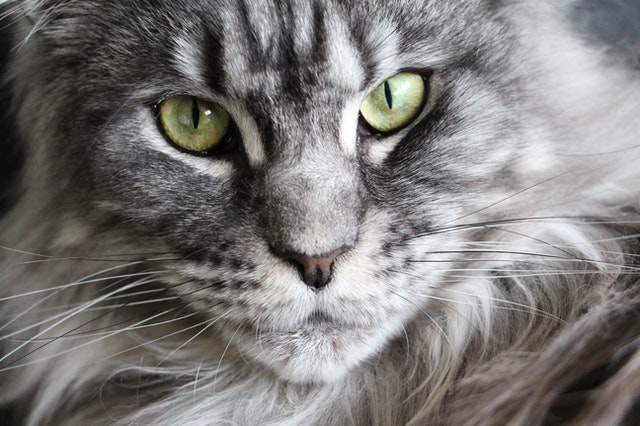
Treatment for Maine Coon Cats with Diarrhea
Many times cleaning up diarrhea in Maine Coon cats is fairly simple.
As we mentioned, if the diarrhea is caused by stress your cat may just need time to acclimate. Keeping their routine as stable as possible could help, as it will giving them a safe space in the house where they can be with their food, water, and litter box without interruption. This can give them time to settle in and adapt to life’s changes.
Another option is to change their diet. Limited Ingredient Diets are a great option to help diagnose or rule out food allergies. There are also diet options like grain-free foods or prescription diets that are formulated to be easily digested.
If you do change your Maine Coon’s diet be sure to give it a few days to see if it is working. If they were allergic to their old food or it bothered their digestive system in some way it could take a few days for the inflammation to go down and for things to return to normal.
Vet Recommendation Options
Medicines. Simple antacids, many of them the same or similar to what we take for our own stomach issues, can be helpful to cats, too. Be sure to get advice on dosages for your vet - remember, your cat weighs about one-tenth what you do!
If your veterinarian suspects inflammatory bowel disease they may also recommend steroids. This can help reduce inflammation and let the digestive system work properly. Steroids can even be helpful for cats with gastrointestinal lymphoma, a type of cancer. Depending on the cause, they may also prescribe antibiotics. Just remember if there are no bacterial infections antibiotics won’t be effective and could actually cause other problems, so your vet may tell you antibiotics are not the right way to treat the issue.
Preventing Diarrhea in Maine Coon Cats
Many of the treatments are also preventative; diet changes and medications could be permanent solutions, depending on what your vet advises.
Make sure your Maine Coon cat is eating an appropriate diet, and seek advice from your vet on specialized foods or prescription options that may be easier to digest. Your vet may also advise you on what you can add to their food to aid in digestion, or help you tweak the balance between your Maine Coon’s wet and dry food.
Prescriptions may also help, whether it is an over-the-counter antacid that is also digestible by a cat in smaller doses, steroids, or another medication altogether.
If you notice that your Maine Coon is particularly susceptible to stress and change make sure they have a consistent routine as much as possible.
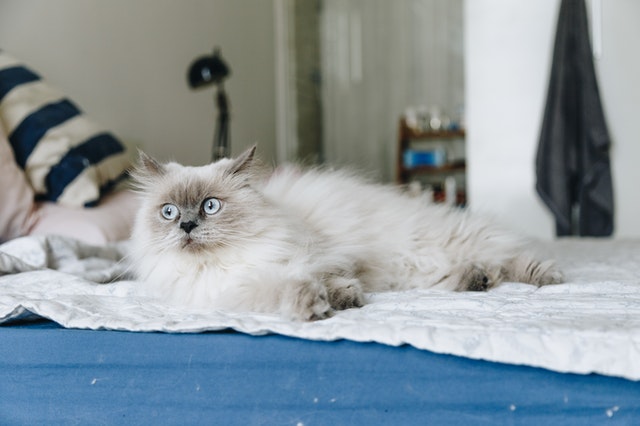
Other Suggestions for Maine Coon Cats with Diarrhea
One other option to consider while getting to the bottom of your Maine Coon’s diarrhea: if you are having trouble helping them keep themselves clean you could ask your veterinarian or a groom to help with a “sanitary shave.”
This is a grooming technique that can be very helpful, particularly for long-haired cats. The vet or groomer can clean and shave the hair around your cat’s hind end, keeping long hair clear of any litter box messes you are dealing with.
This won’t treat or prevent diarrhea itself, but it could help relieve a lot of YOUR stress in the meantime!
Conclusion
There are several reasons your Maine Coon cat could have diarrhea. Many will resolve on their own, but if your cat is sick for more than a day or two or is exhibiting other symptoms of being unwell it is always safest to at least call your veterinarian for advice.
Once you have it all figured out and have a healthy routine to stick to your Maine Coon will quickly be back to its adventurous, active, goofy self! And there’s nothing better than seeing them healthy and happy.

